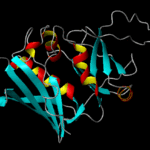 Integrated BioTherapeutics Inc. (IBT), a biotechnology company developing medical countermeasures for biodefense and emerging infectious diseases, this week announced the initiation of a Phase 1 clinical trial testing the safety and immunogenicity of its staphylococcal enterotoxin B vaccine “STEBVAX”.
Integrated BioTherapeutics Inc. (IBT), a biotechnology company developing medical countermeasures for biodefense and emerging infectious diseases, this week announced the initiation of a Phase 1 clinical trial testing the safety and immunogenicity of its staphylococcal enterotoxin B vaccine “STEBVAX”.
STEBVax is a proprietary, attenuated form of Staphylococcal Enterotoxin B (SEB), a member of a group of toxins called superantigens due to the ability to cause a massive inflammatory response leading to toxic shock. The trial marks the first time a superantigen vaccine has been administered to humans.
“SEB is a biowarfare threat to the US and the superantigens can be critical factors affecting the outcome of Staphylococcus aureus infections,” said Dr. M. Javad Aman, IBT President and Chief Scientific Officer. “This clinical study advances our vaccine programs designed to protect military and civilian populations against the threat of SEB and our long-term goal of developing vaccines and therapeutics for Staphylococcus aureus.”
When purified, SEB is a potential bioweapon and was pursued by the US and USSR prior to an international ban on offensive biological and chemical weapons. STEBVax is considered a stand-alone vaccine for biodefense applications but is also a component of IBT’s multivalent vaccine for prevention and treatment of staphylococcal infections in civilian life, a pressing public health problem in light of growing antibiotic resistance. The prospective multivalent vaccine will contain additional toxoids including other attenuated superantigens and pore-forming toxins currently in pre-clinical development at IBT.
The trial is sponsored by the National Institute of Allergy and Infectious Diseases (NIAID) and will be conducted at the Center for Vaccine Development at the University of Maryland in Baltimore, which is one of NIAID’s Vaccine and Treatment Evaluation Units (VTEUs).
“We are extremely pleased to see a decade-long research and development effort, which was heavily supported by the government, reach this critical milestone,” said Aman.
IBT has a history of working with the government to develop biodefense countermeasures. In 2012, the company received a two-year NIAID grant to further develop a proprietary second generation vaccine against viral hemorrhagic fever caused by the deadly Ebola and Marburg viruses. The vaccine would potentially provide protection against all major species of filoviruses.
Sources: PRNewswire, IBT. Image credit: Birkbeck University of London.

